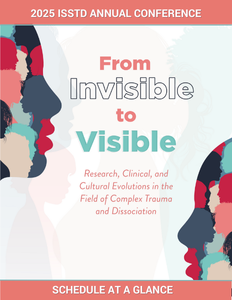Back
Posters
Poster Judging Hour
Couples' Experiences of CPTSD Symptomatology: Impact on Relationship Dynamics
Friday, March 14, 2025
6:00 PM – 7:00 PM US Eastern Time
Learning Level: Beginning

Jennifer M. VanBoxel, PhD, LMFT (she/her/hers)
Core Faculty
The Family Institute at Northwestern University
Chicago, Illinois, United States
Abstract
Complex Post Traumatic Stress Disorder (CPTSD) is widely recognized as the most functionally impairing form of traumatic stress response. Distinct from PTSD, CPTSD is characterized by both the type of trauma exposure that leads to its development and the presentation of its symptoms. In addition to the core symptoms of PTSD, CPTSD includes a cluster of symptoms known as Disturbances in Self-Organization (DSO), which encompass difficulties in emotional regulation, negative self-concept, and challenges in interpersonal relationships.
The trauma that leads to CPTSD is typically chronic, repeated, and occurs within the context of close attachment relationships. Examples include childhood sexual abuse, intimate partner violence, emotional abuse, and various forms of adverse childhood experiences. The interpersonal nature of these traumas means that individuals with CPTSD often struggle with close relationships, particularly intimate partner relationships. Despite the severity of CPTSD and its profound impact on relationships, there is limited understanding of how individuals and their partners experience, manage, and comprehend the effects of CPTSD-specific symptoms within their relationships.
To address this gap, the current study employed a qualitative approach informed by framework analysis to explore the experiences of ten client couples dealing with CPTSD within their relationships. The results revealed the immense burden of symptoms on couples, highlighting the degenerative impact of CPTSD on relationship dynamics. Couples described how symptoms such as emotional dysregulation, dissociation, and negative self-perception strained their interactions, leading to cycles of misunderstanding, conflict, and emotional distance.
However, the study also uncovered meaningful ways in which couples managed and coped with these challenges together. Some couples developed strategies to communicate more effectively, set boundaries, and provide mutual support, demonstrating resilience and adaptability in the face of CPTSD. These findings underscore the importance of considering the relational context in the treatment of CPTSD and suggest that therapeutic interventions should include a focus on supporting both partners in the relationship. Clinical implications include the need for couple-based interventions and further research to explore the nuanced ways in which CPTSD impacts intimate relationships over time.
Complex Post Traumatic Stress Disorder (CPTSD) is widely recognized as the most functionally impairing form of traumatic stress response. Distinct from PTSD, CPTSD is characterized by both the type of trauma exposure that leads to its development and the presentation of its symptoms. In addition to the core symptoms of PTSD, CPTSD includes a cluster of symptoms known as Disturbances in Self-Organization (DSO), which encompass difficulties in emotional regulation, negative self-concept, and challenges in interpersonal relationships.
The trauma that leads to CPTSD is typically chronic, repeated, and occurs within the context of close attachment relationships. Examples include childhood sexual abuse, intimate partner violence, emotional abuse, and various forms of adverse childhood experiences. The interpersonal nature of these traumas means that individuals with CPTSD often struggle with close relationships, particularly intimate partner relationships. Despite the severity of CPTSD and its profound impact on relationships, there is limited understanding of how individuals and their partners experience, manage, and comprehend the effects of CPTSD-specific symptoms within their relationships.
To address this gap, the current study employed a qualitative approach informed by framework analysis to explore the experiences of ten client couples dealing with CPTSD within their relationships. The results revealed the immense burden of symptoms on couples, highlighting the degenerative impact of CPTSD on relationship dynamics. Couples described how symptoms such as emotional dysregulation, dissociation, and negative self-perception strained their interactions, leading to cycles of misunderstanding, conflict, and emotional distance.
However, the study also uncovered meaningful ways in which couples managed and coped with these challenges together. Some couples developed strategies to communicate more effectively, set boundaries, and provide mutual support, demonstrating resilience and adaptability in the face of CPTSD. These findings underscore the importance of considering the relational context in the treatment of CPTSD and suggest that therapeutic interventions should include a focus on supporting both partners in the relationship. Clinical implications include the need for couple-based interventions and further research to explore the nuanced ways in which CPTSD impacts intimate relationships over time.
Learning Objectives:
At the conclusion of this session participants will be able to:
- Define the key symptoms and diagnostic criteria for Complex Post-Traumatic Stress Disorder (CPTSD) in couples, ensuring they can accurately recall and state the differences between CPTSD and other trauma-related disorders
- Explain the impact of CPTSD on relationship dynamics within couples, discussing how these symptoms manifest and affect communication, intimacy, and conflict resolution
- Demonstrate the application of therapeutic interventions tailored to couples where one or both partners have CPTSD, by illustrating how specific strategies can be employed to improve emotional regulation and attachment security
- Analyze the patterns of relational distress associated with CPTSD, distinguishing how different CPTSD symptoms contribute to challenges within intimate relationships and identifying key factors that exacerbate or alleviate these issues
- Assess the baseline fit and effectiveness of current therapeutic models used for CPTSD in couples, recommending modifications to enhance treatment outcomes based on recent research findings and clinical experiences

